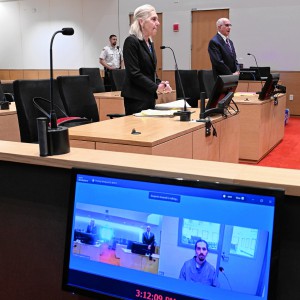10 local schools classified as ‘requiring assistance or intervention’ following MCAS results
| Published: 10-02-2023 5:00 PM |
Gill Elementary School and Petersham Center School have emerged as two of the state’s 66 strongest-performing schools relative to MCAS test taking, while 10 others in Franklin County and the North Quabbin region have been classified as “requiring assistance or intervention” following the release of spring MCAS scores.
Schools “requiring assistance or intervention” include Athol Community Elementary School, Athol High School, Athol-Royalston Middle School, Buckland-Shelburne Elementary School, Dexter Park Innovation School, Federal Street School, Greenfield Middle School, Greenfield High School, Mohawk Trail Regional School and Newton School.
Each school was evaluated by the state’s Department of Elementary and Secondary Education (DESE) based on “accountability percentile” and “criterion-referenced target percentage.” DESE explains the “accountability percentile” category as “an indication of the school’s overall performance relative to other schools that administer similar assessments, and is calculated using up to two years of data for all accountability indicators.” DESE explains that the “criterion-referenced target percentage” category “combines multiple years of data related to achievement, growth, high school completion, English learner (EL) progress, advanced coursework completion and chronic absenteeism into a single number between 0 and 100.” A criterion-referenced target percentage of 75% or higher indicates that a school is meeting or exceeding targets.
While Gill Elementary scored in the 50th percentile for accountability, it scored in the 90th percentile for criterion-referenced target percentage, indicating considerable improvement from scores in 2022.
Principal Walter Huston said his school’s MCAS (Massachusetts Comprehensive Assessment System) test results are “just a piece of the larger picture of what is happening” in the Gill-Montague Regional School District as a whole. Jeanne Powers, the district’s director of teaching and learning, said such success stems from district staff’s efforts to “really meet students where they are and bring them to the next level of their academic growth.”
“We’re very excited about this recognition,” Powers said. “Across the district, we’ve been working really hard to increase MCAS scores and our programming.”
Specific strategies she cited as conducive to excellence and growth were the adoption of revised math and English language arts curriculum “to really strengthen evidence-based learning,” as well as the institution of new math and ELA intervention programs in the past few years.
Petersham Center School Principal Aaron O’Connor credited the staff for a collective effort, from the custodians up to the administrative staff.
Article continues after...
Yesterday's Most Read Articles
 Work on Pinedale Avenue Bridge connecting Athol and Orange to resume
Work on Pinedale Avenue Bridge connecting Athol and Orange to resume
 $700K debt exclusion would fund repairs to Raymond Hall
$700K debt exclusion would fund repairs to Raymond Hall
 Lawyer argues Joshua Hart’s 2018 conviction for Orange murder had inconsistent verdicts
Lawyer argues Joshua Hart’s 2018 conviction for Orange murder had inconsistent verdicts
 UMass basketball: Minutemen nab another transfer in Arizona State forward Akil Watson
UMass basketball: Minutemen nab another transfer in Arizona State forward Akil Watson
 More than 130 arrested at pro-Palestinian protest at UMass
More than 130 arrested at pro-Palestinian protest at UMass
 Erving voters say ‘no’ to $3.7M debt exclusion
Erving voters say ‘no’ to $3.7M debt exclusion
“It’s really just a matter of putting together an awesome team and making sure they’re on the same page,” he said.
One of the more significant curriculum changes was the introduction of new math classes, taken from several options presented by the state. O’Connor said the curriculum chosen has an adaptive online aspect that helps identify weaknesses in individual students and address them.
“One of the big things is we worked really hard last year with the new math curriculum,” said O’Connor. “We felt really good about the one we implemented last year.”
Buckland-Shelburne Elementary was marked as requiring assistance or intervention because it had less than 95% participation for students with disabilities who are low-income and high needs.
Principal Hayley Gilmore expressed her frustration with the designation of “requiring assistance” because she feels the formula is biased against small schools. She explained the school was marked with this designation because just three students did not participate in taking the test.
“I don’t understand why there isn’t a human being looking at it, saying, ‘This formula does not work when there are less than 100 kids,’” she said, calling the formula “ludicrous.”
Gilmore pointed out that the students’ academic scores across the school were better than in previous years, which she credits to the new inquiry-based curriculum.
Three of the schools in the Athol-Royalston Regional School District — Athol Community Elementary, Athol Middle and Athol High — found themselves in the categories of “needing support.” The middle and high schools need “targeted support,” while ACES is listed as being “in need of broad/comprehensive support.”
Superintendent Matthew Ehrenworth said it’s not the first year the district’s MCAS scores have led to this ranking. One issue he pointed to is that the recent MCAS marked a shift back to the full exam, which was given in a partial format during the pandemic.
“For a lot of students, it was the first time taking the full test,” said Assistant Superintendent Cynthia Kennedy. “It was not an easy assessment.”
Teacher retention has proven problematic, Ehrenworth and Kennedy agreed. The district has seen a great deal of turnover, with some new hires only staying long enough to finish their training before moving on.
“We’re focused on beefing up the mentoring program and new teacher support,” Ehrenworth said. “Show the teachers that they are respected and appreciated and to keep them here.”
The district has made changes that it hopes will alleviate these issues. Recently, a new contract was signed with the Athol Teachers Association offering raises over the next three years. Plus, the district has committed to professional development services. New curriculum systems are also being pursued to help students with English language arts and math courses.
“Lots of pieces in place,” Ehrenworth said. “We’re making sure there is consistency across the classrooms.”
Greenfield High School and Newton School joined the middle school and Federal Street School as schools “requiring assistance or intervention.”
“We’re not happy about it, but I’m not completely surprised,” said Superintendent Christine DeBarge. “When I started in the district as superintendent, curriculum instruction was one of the pieces that my interview process was focused on. … It takes time to change academic performance measured on assessments that are nationally normed.”
DeBarge said administrators are still “doing a deeper review” of this year’s results, and she plans to present the analysis at next month’s School Committee meeting.
“At this point, we feel confident that the steps outlined in the strategic plan are the right way to go, and we’re implementing those, even though it’s only September … specifically the academic pieces,” she said. “Those are in full swing and we do feel confident that’s the right path.”



 Sportsman’s Corner: The quest for the Super Slam
Sportsman’s Corner: The quest for the Super Slam Annual ‘Food-A-Thon’ returns
Annual ‘Food-A-Thon’ returns Erving Town Meeting voters back Care Drive housing project
Erving Town Meeting voters back Care Drive housing project North Quabbin Notes, May 9
North Quabbin Notes, May 9